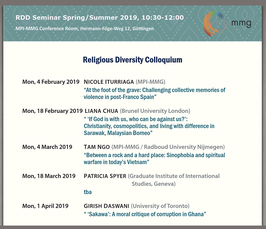" ‘Sakawa’: A moral critique of corruption in Ghana"
Religious Diversity Colloquium Spring/Summer 2019
- Date: Apr 1, 2019
- Time: 10:30 AM - 12:00 PM (Local Time Germany)
- Speaker: Girish Daswani (University of Toronto)
- Girish Daswani is an Associate Professor of Anthropology at the University of Toronto. His research interests include Ghana, religion, Christianity, morality and ethics, transnationalism, corruption and activism. His most recent scholarly work has been exploring different activist and religious responses to corruption in Ghana. In addition to several articles in anthropology journals, he has published a monograph entitled Looking Back, Moving Forward: Transformation and Ethical Practice in the Ghanaian Church of Pentecost (2015, University of Toronto Press) and co-edited A Companion to Diaspora and Transnationalism Studies with Prof. Ato Quayson (2013, Wiley-Blackwell). You can read his public-facing scholarship on the blog Everyday Orientalism and watch his Tedx UTSC talks on Youtube (2014 and 2018).
- Location: MPI-MMG, Hermann-Föge-Weg 12, Göttingen
- Room: Conference Room

For more details please contact vdvoffice(at)mmg.mpg.de.
This lecture discusses “Sakawa,” illegal practices that combine Internet fraud and secret ritual practices at shrines. More specifically, it poses the questions of when it appears as a moral problem and what it is doing in these various contexts. The analysis will focus on two cases discussed: (1) Sakawa as a form of economic survival amongst Ghanaian men that sometimes involves aspiring entrepreneurs giving away either sexual vitality or human life in exchange for quick wealth; (2) the Ghanaian government as a “Sakawa government,” a metaphor that expresses a critique of the country’s politicians and charismatic pastors, who are described as corrupt and immoral. Bringing these two examples into comparison, I argue that Sakawa provides an ethical framework that raises questions about corruption, from what is at stake in getting rich too quickly or through illicit means, to how the redistribution of wealth is central to correcting an existing imbalance in a neoliberal economy.